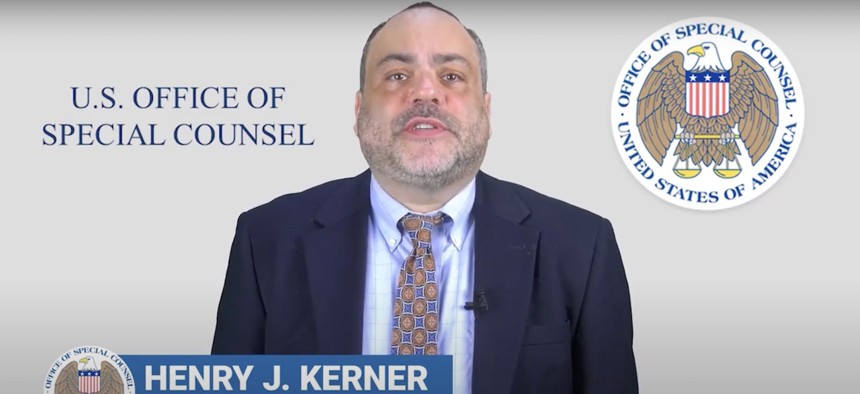
While originally a Trump appointee, Henry Kerner won unanimous approval in 2017 to serve at OSC. Office of Special Counsel/Screengrab by GovExec
Biden looks to swap leadership at civil service watchdog agencies
White House nominates a Trump appointee for a new role overseeing enforcement of civil service laws.
President Biden has nominated the head of one civil service watchdog agency to instead serve at another, potentially shifting an appointee first nominated by President Trump.
Henry Kerner, the current leader of the Office of Special Counsel, would serve in the third and final slot on the Merit Systems Protection Board. He will remain at OSC pending his confirmation, which will require Senate approval.
Kerner’s original five-year term at OSC expired last year, but he is serving his allowable one-year holdover period until October. If he has not already been confirmed for MSPB at that time, he will have to leave OSC then. While originally a Trump appointee, Kerner won unanimous approval in 2017 to serve at OSC. He previously worked for various Republican committee leaders on whistleblower investigations.
Kerner continued working on those issues at OSC, which oversees whistleblower protection laws in the civil service and enforcement of the Hatch Act. At MSPB, where Kerner—a Republican—will serve in the slot designated for the minority party, he will help decide federal employee appeals of agency disciplinary actions.
A White House official noted it was standard practice for Republican congressional leadership to put forward nominees for boards and commissions in which bipartisan membership was required. Biden's previous nominees who are now serving on the board, Ray Limon and Cathy Harris, are both Democrats.
Kerner has overseen high-profile cases throughout his five-plus years leading OSC, most notably when his office called for Trump advisor Kellyanne Conway to be fired for her repeated Hatch Act violations. More recently, OSC has cited various Biden administration officials for speaking on political matters while in their official capacities.
Kerner testified before Congress on the Conway case, where he defended his agency’s decision. OSC, he said, protects two groups: federal workers, who can’t be co-opted into performing political work, and taxpayers, who deserve “nonpolitical” services from federal employees.
Conway’s actions and the White House resistance to the OSC “send a message that people need not adhere to the Hatch Act and that White House officials are above the law,” Kerner said. “The OSC will continue its distinguished history of enforcing the Hatch Act.”
He has repeatedly sought to publicize OSC’s role in protecting the federal workforce, stressed that he would be “fair and impartial,” and told Congress he would always “treat the well-connected just as we do the little guy.”
Kerner came into OSC looking to speed up the adjudication process, something his potential future employer is also hoping to accomplish. MSPB went five years without a quorum, leaving a backlog of thousands of cases that faced a secondary appeal to the agency’s central board. The board briefly had all three Senate-confirmed slots filled, but that ended when Tristan Leavitt left to run for office just as his term was expiring. As of last month, the board had addressed about 40 percent of its inherited backlog but still had more than 2,200 cases pending.
The existing board members have said they can move more quickly when all three members are confirmed.
Biden has yet to nominate a replacement for Kerner. If he were to depart prior to the Senate confirming someone for the role, the principal deputy special counsel—currently Nicole Brightbill—would serve as acting special counsel. Unlike at MSPB, the vacancy would not create any statutory disruptions to OSC operations.







